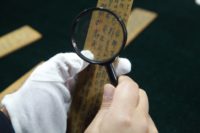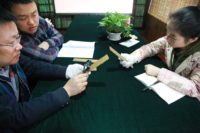Many kings have a thing about immortality, usually with good reason because ruling was a high-risk job. The living incarnations of the gods, Egypt’s pharaohs were mummified to extend their physical bodies into the immortal realm. Alexander the Great was said to have sought out a yogi in India so he could discover the secret to eternal life (which he would turn out to need far sooner than he realized). Mithridates of Pontus was reputed to have ingested tiny amounts of every poison known to make himself unkillable (iocane powder was not reportedly among them) after his father was assassinated by poison, and Roman emperors deified their (less reviled) predecessors and were deified themselves posthumously as a matter of rote.
Qin Shi Huang, first emperor of a united China (reined 220–210 B.C.) and founder of the Qin dynasty which barely survived him by three years, had much in common with his fellow monarchs. He’d fought bloody wars his whole life, taking the throne of the Qin kingdom when he was 13 years old and fighting his way to becoming the ultimate victor of China’s Warring States Period 25 years later. Previous dynasts used the word for “king.” Qin Shi Huang literally coined the word for “emperor” which has been used by Chinese monarchs ever since.
As unrelenting as he was in battle he was equally driven to find the secret of eternal life. He covered several bases there, creating the wonder-of-the-world greatness of the Terracotta Army for his huge mausoleum complete with rivers of mercury (believe to be a boon to preservation of tissues). That was the failsafe, as it happens. Plan A was not to die at all, and just like his counterparts out west, he had good reason for his pathological fear of the reaper. He survived at least three foiled assassination attempts and several coups during his lifetime. In a twist that would make an ancient Greek tragedian weep tears of bitter jealousy and regret, the First Emperor died in a palace in the far east of his realm where he had gone to score an elixir of life from some Taoist wizards who said they knew of one hidden on a remote island under the watchful eye of a guardian sea monster. He never did make it to the sea monster. Something else killed him first: the mercury-filled “medicinal” poison pills given him by his physicians to give him eternal life. It was 210 B.C. and he was 49 years old.
 If it has a whiff of the goat song, no-escaping-destiny about it as a conclusion to the story, it’s all the more goaty now that archaeologists have confirmed that Qin Shi Huang was all over the elixir of life from the minute his ample rump hit the throne. As soon as he claimed the title, the Emperor issued an order to all regional authorities that they seek out the secret to immortality and relay it to him. The poor local guys did the best they could and the Qin Emperor got numerous replies written on wooden slips, thousands of which were discovered at the bottom of a well in Hunan province in 2002.
If it has a whiff of the goat song, no-escaping-destiny about it as a conclusion to the story, it’s all the more goaty now that archaeologists have confirmed that Qin Shi Huang was all over the elixir of life from the minute his ample rump hit the throne. As soon as he claimed the title, the Emperor issued an order to all regional authorities that they seek out the secret to immortality and relay it to him. The poor local guys did the best they could and the Qin Emperor got numerous replies written on wooden slips, thousands of which were discovered at the bottom of a well in Hunan province in 2002.
Archaeologists have been studying the slips since then and the Qin tombs found at the site ever since and have collected remarkable evidence of how wide-ranging the search was, a personally committed and involved the emperor was in search for the elixir.
Zhang Chunlong, a researcher at the provincial institute of archaeology, said the emperor’s decree reached frontier regions and remote villages.
According to the calligraphic script on the narrow wooden slips, a village called “Duxiang” reported that no miraculous potion had been found yet and implied that the search would continue. Another place, “Langya,” in today’s eastern Shandong Province near the sea, presented a herb collected from an auspicious local mountain.
The discovery demonstrated the emperor’s centralization of authority.
“It required a highly efficient administration and strong executive force to pass down a government decree in ancient times when transportation and communication facilities were undeveloped,” Zhang said.
 It has taken a long time to examine the collection and pull them by topic. There are over 36,000 slips written using 200,000 ancient Chinese characters from 222-208 B.C covering subjects from politics to military plans to legal provisions and more. Archaeologists found 48 slips that directly reference medical questions, mostly the elixir but not solely. These document treatments that were popular then and are still part of traditional Chinese medicine today. They also revealed what a thoroughly well-developed health services system the Qin Dynasty had put together in such a short time. It was highly regulated. Doctors could only take patients under their care when told to do so by the government and all treatments had to be assiduously recorded for inspection. The patients were overwhelmingly wealthy members of the elite who could afford all theis doctorin’.
It has taken a long time to examine the collection and pull them by topic. There are over 36,000 slips written using 200,000 ancient Chinese characters from 222-208 B.C covering subjects from politics to military plans to legal provisions and more. Archaeologists found 48 slips that directly reference medical questions, mostly the elixir but not solely. These document treatments that were popular then and are still part of traditional Chinese medicine today. They also revealed what a thoroughly well-developed health services system the Qin Dynasty had put together in such a short time. It was highly regulated. Doctors could only take patients under their care when told to do so by the government and all treatments had to be assiduously recorded for inspection. The patients were overwhelmingly wealthy members of the elite who could afford all theis doctorin’.
This is a remarkable collection of official archival records from a very short-lived (nyuk) dynasty that has other left very few written records behind. The slips aren’t just a fascinating combination of nostra, legends and alchemy from the period; they are also a thick slice of government administration preserved for more than 2,000 years, which is the kind of immortality I can 100% get behind. For many archaeologists and historians, this assemblage is as important as the terracotta warriors and mausoleum because every word lends new insight into how the First Emperor went about the business of governing his newly unified domain.